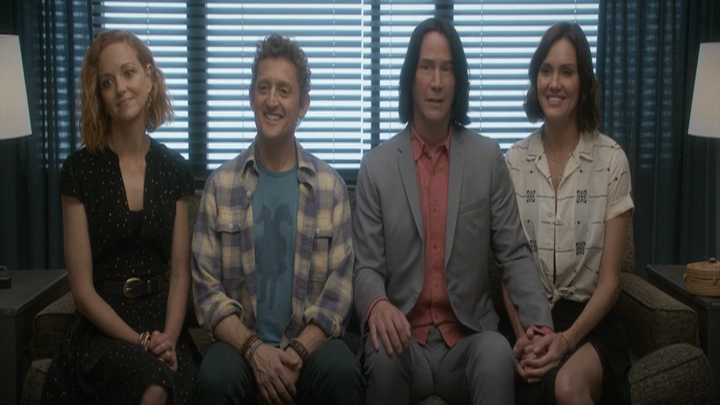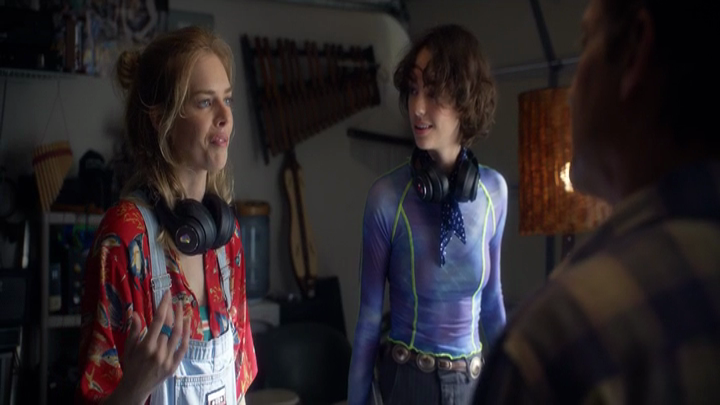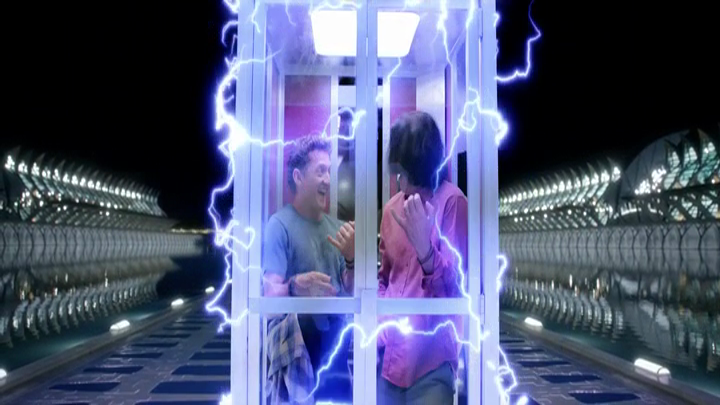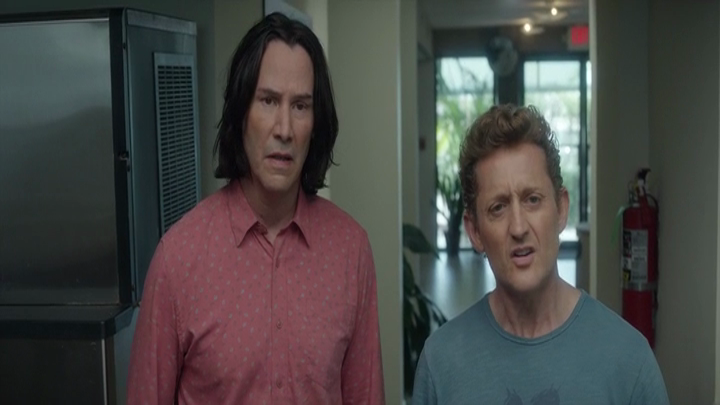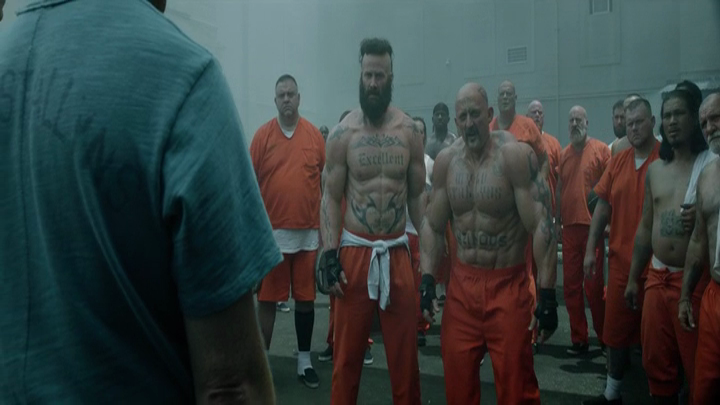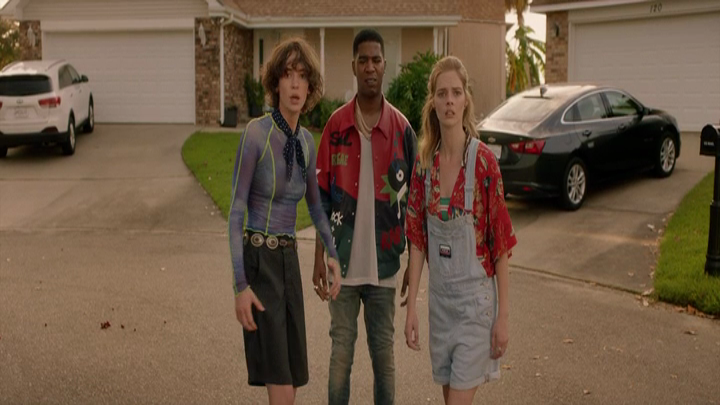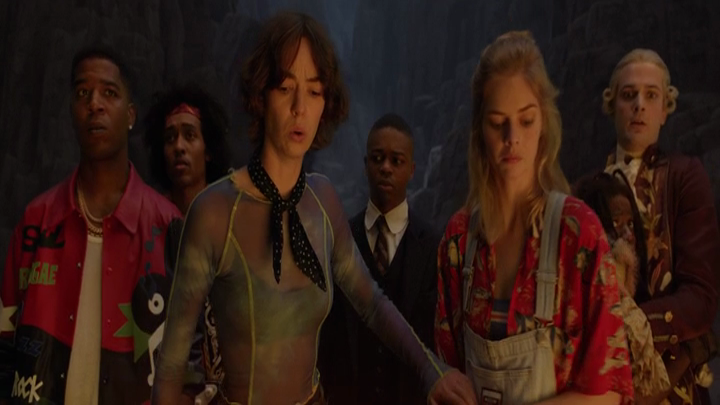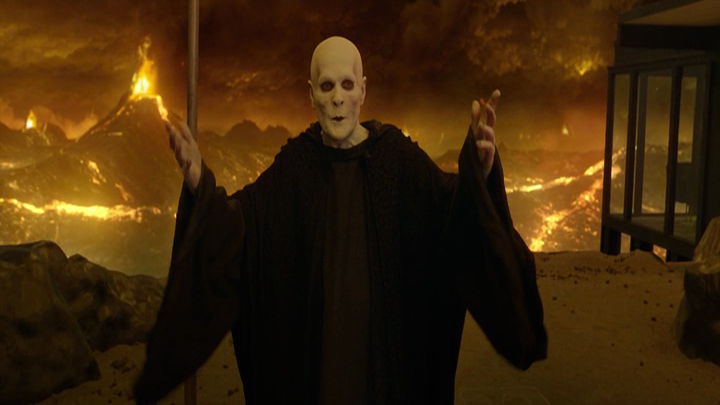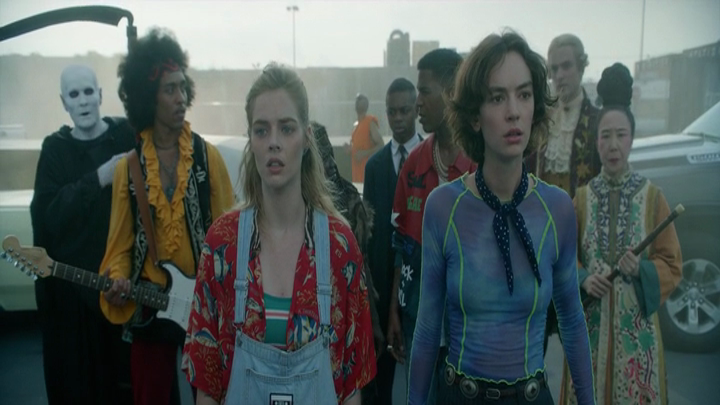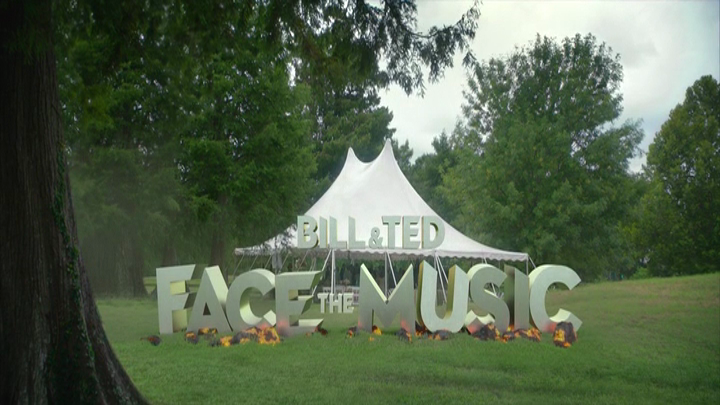
#419 – Bill and Ted Face the Music (2020)
Bill and Ted Face the Music (2020)
Film review #419
Director: Dean Parisot
SYNOPSIS: Bill S. Preston esquire and Ted “Theodore” Logan were supposed to unite the world through their music. Nearly thirty years after they played a gig to the world, they are still yet to write the song that will they are destined to actually unite the world with. Now married with grown-up children, Bill and Ted are confronted with their failure by being told that reality will cease to exist unless they can write the song. Bill and Ted have the idea to travel into the future and take the song from themselves when they’ve written it, while their daughters Billie and Theo travel into the past to gather up some famous musicians to help them out. However, the Great Leader of the future has lost faith in the duo, and has sent a killer robot to track them down through time and kill them, believing that their deaths may be able to save reality…
THOUGHTS/ANALYSIS: Bill and Ted Face the Music is a 2020 sci-fi comedy film, and the third film in the series, after 1991′s Bill and Ted’s Bogus Journey. The film opens thirty years after the events of the previous film, with Bill and Ted playing the music for the wedding of Ted’s younger brother Deacon, and Missy who was Bill’s step-father in the first film, and Ted’s step-father in the second, which makes for a humourous scene that brings together a lot of the characters of the previous films, and shows what they have been up to in the twenty-five years since we saw them last. However, for Bill and Ted themselves, the last twenty-five years have not been so kind, as they have constantly failed to fulfil their destiny and write the song that will supposedly bring universal harmony and save reality. They are summoned to the future where they are asked to explain their actions, but their usual charm doesn’t seem to be working this time. They are forced to work on the song as the timer counts down to when they must perform it. They have the idea to instead travel to the future and take the song from themselves when they have written it, and so begins another ‘excellent adventure’ for the duo as they travel to various points in their future to find the song they supposedly have to write. After a thirty-year gap between films, there is undoubtedly a lot of expectations for someone who grew up watching these films for this new one to live up to the nostalgia of the first two. Thankfully, and perhaps even surprisingly, this film manages to capture the feel of the previous films, while also taking them somewhere new through the future and possible realities. At the heart of it though, is still this unshakeable friendship between two rock-loving guys which forms the basis for bringing out the very best in the entire universe. The film acknowledges its predecessors through both returning many of the characters, and also small little references which will make you laugh if you recognise them. The Bill and Ted films were never perfect or perfectly-polished masterpieces; they were just a fun adventure about two ordinary guys who have extraordinary adventures, and this film fits in perfectly to that. It didn’t have to be made, but it was made for the fans that have such a fond memory of the films, and through the return of the original writers and many of the characters, it’s hard to see how they could have made a better movie to round off the trilogy. Like I say, the previous films aren’t perfect and neither is this one, but again that nevertheless binds them together.
The main plot of the film is mostly split into two: firstly, you have Bill and Ted travelling to visit themselves in the future to find the song that they will supposedly write, and take it back to the present. In doing so, they come across many versions of themselves where they didn’t write the song, and their lives have fallen apart, including their wives leaving them. Bill and Ted, through this constant time-hopping, are brought into contact with the consequences of their actions, and try to avoid their bad futures by fixing the present. This again reflects the tireless wholesomeness of the duo as they recognise their mistakes and try to do everything they can to fix them. They are also being chased down by a robot from the future, sent by the Great Leader who believes that since Bill and Ted fled from the future and making the song, another interpretation of how to save reality would be to kill them, and so she sends the robot to do it. The series has never really needed villains: in the second film, the villain doesn’t really have much of a role to play himself, but rather just sets things in motion. The driving force of the films has always been about Bill and Ted learning something and improving themselves, rather than defeating an overarching villain, and again, this film does that too. The killer robot does have a small redemption arc as he is integrated into the cast, and it again shows how Bill and ted can win over just about anyone. The other main plot point concerns Bill and Ted’s daughters Billie and Thea, as they try and help their Dad’s out by travelling into the past and collecting famous musicians to help with performing the song. This element of the plot is a little weaker than the scenes focusing on Bill and Ted, and is quite similar to the first film. Nevertheless, there’s still plenty of laughs to be had, and Billie and Thea are genuinely likeable characters, in that they reflect their Father’s mannerisms and optimism, combined with being adults of the 21st century. More could have been done with their characters, but I think keeping focus on Bill and Ted themselves is the appropriate decision. Kelly, who is the daughter of Rufus, the duo’s mentor from the first two films, is also a fun character who doesn’t have the coolness of her father, but is still doing her best. Although she is not her Father (the actor who played him, George Carlin, passed away between the film), her belief in Bill and Ted reflects that constant returning theme of how a simple optimism, while not being afraid of confronting reality, can make a difference, even if you’re not as cool as Rufus.
As I mentioned, i have very little criticisms regarding the film, but there are definitely some things which stand out as being issues. While the majority of the film is well balanced and structured, the last part feels a bit rushed, with everyone getting together and a lot of references being used which leaves little time to appreciate them, and the magnitude of, for example, returning from the dead. Perhaps the main hindrance is the lack of budget: it is obvious that a lot of the scenes from the future etc. are done on greenscreen, and makes some of them feel a bit static and lifeless compared with the energy and often weirdness we got in the previous films. None of the films are very high budget, and that’s part of the charm in that the ordinariness of the leads juxtaposes against the bizarre situations they find themselves. The ending of the film had a revelation that was quite easy to spot ahead of time, and it accomplishes what you expect and want it to: it goes big for the big finale which saves reality, but again I feel like it needed just a little more spectacle than the budget could afford. Nevertheless, It is definitely satisfying, and does the story justice. One cool little feature is that the countdown to the time that Bill and Ted have to perform their song is exactly in synchronicity with the runtime, adding that little extra investment. The song itself that they perform is pretty much perfect: it combines a host of instruments that encapsulate the diversity of reality while having that distinct classic rock/metal sound that Bill and Ted is known for. The fact that it has no lyrics also reflects how the power of music transcends language. It sounds like the song I’ve been waiting thirty years to hear. The more I think about it, the more I appreciate it, and I think this just reinforces just how this film nailed exactly what Bill and Ted is about and how it did exactly what it needed to thirty years later.
Overall, Bill and Ted Face the Music is a worthy, and fully-formed addition to the beloved series: it doesn’t feel like a cash-in or a pointless add-on, but takes the characters people remember fondly and allows them to fulfil the potential they have been destined for for thirty years. It’s a love-letter to those people who grew up with the characters and have a nostalgia for them, and the film never feels like a disservice to that nostalgia, which in itself is a remarkable achievement if you look at other franchises which try to do the same thing. Even though the previous films explored all that could be explored through both the past and after-life, Face the Music still offers something new in the travels through the future and confronting their alternate selves, and the weight of their actions. Throughout it all, even when Bill and Ted are despondent in their lack of success in writing their world-changing song, their simple, but persevering optimism always sees them through the darkest of times. Alongside this, this optimism does not blind them to confronting the mistakes they have made, and are constantly trying to fix things (they continually “face the music” in more ways than one). Face the Music really captures the themes of the series, and brings them together in a satisfying way. It’s not a perfect film, but neither were it’s predecessors, which makes them fit together well. The film is visually hampered by it’s lack of budget and over-reliance on greenscreen, but those are really minor issues that don’t detract from the film’s story and message. For any fan of the previous films who remembers them fondly, Bill and Ted Face the Music is both a worthy tribute and a successful continuation of the story of two ordinary teenagers who have gone on to accomplish extraordinary things.

